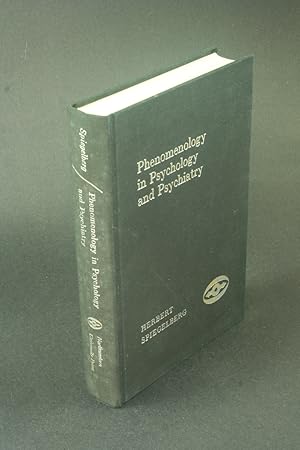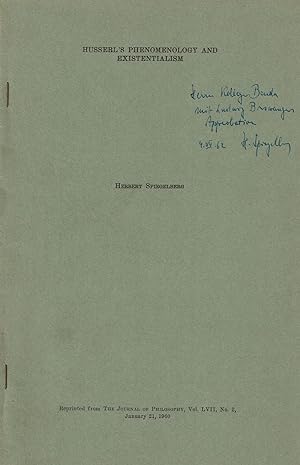spiegelberg herbert 1904 1990 (3 Ergebnisse)
Produktart
- Alle Product Types
- Bücher (3)
- Magazine & Zeitschriften
- Comics
- Noten
- Kunst, Grafik & Poster
- Fotografien
- Karten
- Manuskripte & Papierantiquitäten
Zustand
- Alle
- Neu
- Antiquarisch (3)
Einband
Weitere Eigenschaften
- Erstausgabe
- Signiert (2)
- Schutzumschlag
- Angebotsfoto (3)
- Keine Print-on-Demand Angebote (3)
Gratisversand
- Versand nach USA gratis
Land des Verkäufers
Verkäuferbewertung
-
Phenomenology in psychology and psychiatry; a historical introduction.
Verlag: Evanston [Ill.: Northwestern University Press, 1972, 1972
Anbieter: Steven Wolfe Books, Newton Centre, MA, USA
Spiegelberg, Herbert, 1904-1990. Phenomenology in psychology and psychiatry; a historical introduction. Evanston [Ill.: Northwestern University Press, 1972, xlv, 411pp., flecks and splotches on spine, soiled and stained black cloth, otherwise internally very good and appears little used, but must be considered damaged due to spine, previous owner's blindstamp. Northwestern University studies in phenomenology & existential philosophy. - CONTENTS: 1. Phenomenological psychology in phenomenological philosophy -- 2. Phenomenological philosophy in some major schools of psychology -- 3. Phenomenology in psychopathology and psychiatry -- 4. Phenomenology in psychoanalysis -- 5. The American scene : beginnings -- 6. Karl Jaspers (1883-1969) : introducing phenomenology in psychopathology -- 7. Ludwig Binswanger (1881-1966) : Phenomenological anthropology (Daseinsanalyse) -- 8. Eugene Minkowski (b.1885) : Phenomenology of the lived (Vecu) -- 9. Viktor Emil von Gebsattel (b.1883) : Phenomenology in medical anthropology -- 10. Erwin Straus (b.1891) : phenomenological rehabilitation of man's senses -- 11. Frederik Jacobus Johannes Buytendijk (b.1887) : phenomenology in biology -- 12. Kurt Goldstein (1878-1965) : a rapprochement -- 13. Paul Schilder (1886-1941) : between psychoanalysis and phenomenology -- 14. Medard Boss (b.1903) : phenomenological daseinsanalytik -- 15. Viktor Frankl (b.1905) : phenomenology in Logothermapy and Existenzanalyse -- 16. Concluding reflections. 9780810103573 ISBN 0810103575.
-
HUSSERL'S PHENOMENOLOGY AND EXISTENTIALISM.
Verlag: Lancaster, PA: Lancaster Press, Inc., (1960). (1960)., 1960
Anbieter: Blue Mountain Books & Manuscripts, Ltd., Cadyville, NY, USA
Signiert
Zustand: Fine. INSCRIBED BY HERBERT SPIEGELBERG TO HIS COLLEAGUE CLEMENS E. BENDA, THE AUTHORITY ON DOWN SYNDROME - Octavo, 9-3/8 inches high by 6-1/8 inches wide. Softcover, bound in stapled printed green wraps. [14] pages, numbered 61 through 74. Near fine. An offprint, reprinted from "The Journal of Philosophy, Vol. LVII, No. 2, January 21, 1960". Inscribed on the front cover by the American philosopher Herbert Spiegelberg to his colleague Clemens Benda, the authority on Down syndrome. Dated "4.VII.62" by the author and signed "H. Spiegelberg". Spiegelberg has additionally crossed out the conclusion of John Wild's essay on the first page and a half, which precedes his own article. Born in Strasbourg, the American philosopher Herbert Spiegelberg (1904-1990) played a significant role in advancing phenomenological philosophy in the U.S. He met Edmund Husserl and other pioneers in the European phenomenological movement while studying at the University of Munich. After spending a year in England in 1937, Spiegelberg emigrated to the U.S. where he taught at Swarthmore College and subsequently Lawrence University. He published his landmark work "The Phenomenological Movement: A Historical Introduction" with assistance from grants he received from the Rockefeller Foundation in 1953 through 1956. Considered the authority on Down syndrome, which was then referred to as "Mongolism", Dr. Clemens E. Benda (1898-1975) was recognized as an internationally known expert on "mental deficiency". Benda argued for an end to "artificial distinctions between mental defect and mental illness" and believed that "so-called mentally deficient children are often the victims of unfair and unjust discrimination". Born in Berlin where he received his medical degree, Benda worked as a psychiatrist at the Binswanger Sanitarium in Switzerland. He moved to the U.S. as a research fellow at Harvard Medical School, eventually teaching at both Harvard and the University of Munich. Benda was also director of research and psychiatry for the Commonwealth of Massachusetts, the Walter E. Fernald School, and the Wrentham State School in Massachusetts.
-
PERSPEKTIVENWANDEL: KONSTITUTION EINES HUSSERLBILDES. [An offprint of Herbert Spiegelberg's article which appeared in the publication titled "EDMUND HUSSERL 1859-1959. Recueil Commemoratif Publie a l'Occasion du Centenaire de la Naissance du Philosophe"].
Verlag: La Haye: Martinus Nijhoff, 1959., 1959
Anbieter: Blue Mountain Books & Manuscripts, Ltd., Cadyville, NY, USA
Signiert
Zustand: Very good. INSCRIBED BY HERBERT SPIEGELBERG TO HIS COLLEAGUE CLEMENS E. BENDA, THE AUTHORITY ON DOWN SYNDROME - Octavo, 9-1/2 inches high by 6-1/8 inches wide. Softcover, unbound self-wraps. [18] pages in all, consisting of a cover leaf and title leaf, a 3-page table of contents listing all of the articles which where published in the full volume, 2 blank pages and Spiegerberg's article here printed on pages numbered [56] through 63. There is a small stain to the cover page. Very good. An offprint of Spiegelberg's article which appeared as a pamphlet published as part of the "Phaenomenologica" series. "Spiegelberg, in his article 'Perspektivenwandel: Konstitution eines Husserlbildes', tells us that as a student of law Husserl had pointed him to the work of Reinach. However, Husserl added that something more was needed than Reinach's ontology, what was needed was a phenomenology of legal consciousness." [Quoted from "Reinach as Phenomenologist" by James M. Dubois. Inscribed on the front cover by the American philosopher Herbert Spiegelberg to his colleague Clemens Benda, the authority on Down syndrome. Dated "4.VII.62" by the author and signed in full "Herbert Spiegelberg". Born in Strasbourg, the American philosopher Herbert Spiegelberg (1904-1990) played a significant role in advancing phenomenological philosophy in the U.S. He met Edmund Husserl and other pioneers in the European phenomenological movement while studying at the University of Munich. After spending a year in England in 1937, Spiegelberg emigrated to the U.S. where he taught at Swarthmore College and subsequently Lawrence University. He published his landmark work "The Phenomenological Movement: A Historical Introduction" with assistance from grants he received from the Rockefeller Foundation in 1953 through 1956. Considered the authority on Down syndrome, which was then referred to as "Mongolism", Dr. Clemens E. Benda (1898-1975) was recognized as an internationally known expert on "mental deficiency". Benda argued for an end to "artificial distinctions between mental defect and mental illness" and believed that "so-called mentally deficient children are often the victims of unfair and unjust discrimination". Born in Berlin where he received his medical degree, Benda worked as a psychiatrist at the Binswanger Sanitarium in Switzerland. He moved to the U.S. as a research fellow at Harvard Medical School, eventually teaching at both Harvard and the University of Munich. Benda was also director of research and psychiatry for the Commonwealth of Massachusetts, the Walter E. Fernald School, and the Wrentham State School in Massachusetts.




![Bild des Verkäufers für PERSPEKTIVENWANDEL: KONSTITUTION EINES HUSSERLBILDES. [An offprint of Herbert Spiegelberg's article which appeared in the publication titled "EDMUND HUSSERL 1859-1959. Recueil Commemoratif Publie a l'Occasion du Centenaire de la Naissance du Philosophe"]. zum Verkauf von Blue Mountain Books & Manuscripts, Ltd.](https://pictures.abebooks.com/inventory/md/md30753083871.jpg)